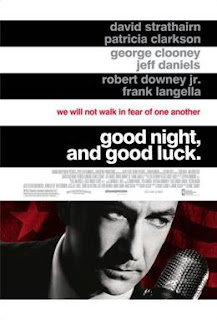In class we watched the movie “Good Night, and Good Luck” (2005) which was directed by none other than George Clooney. It’s set during the McCarthy Era, the Red Scare, and times of communist mistrust, and was based on an entirely true story from the 1950s. The main purpose of the movie is to display to the audience how the government’s involvement has turned into the government silencing the media. It also highlights the issues within media companies, and how corporate and editorial tend to butt heads on many points.
The film follows the storyline of the main character, Edward Murrow (David Strathairn), he’s a reporter at CBS and was famous for going after one of the biggest stories, McCarthy. Despite the rumors swirling around Murrow being a part of the communist party, he decides to lead a charge against McCarthy and the government, calling them out for corruption and fabrications of McCarthy. Following the lead of McCarthysim, ignoring the threats of losing his prime time slot, he created a show with his colleagues that exposed all of McCarthy’s malpractices.
Once the news broke, the movie shows how quick other news companies picked up the story and ran with it, each giving an opposing viewpoint on Edward Murrow’s actions. One calls them brave, while the other says they spew propaganda in a machiavellian manner. But the main purpose was to bait Senator McCarthy into coming onto the show himself. It was an ingenious plan, as the senator went in for the interview, threw out a bunch of nonsense, and left. Following his appearance Murrow went live, naming true or false on everything said prior, which got the senate to open up an investigation. His determination and lack of fear of communism and the government is what contributed to his success in exposing Senator Joseph McCarthy for his corruption and lies.
Going off some of the talking points from the discussion class, this movie shows how with keeping the press and government separate, bad people can be pushed out of office. That the press is in place as a check on the government and their job is to critique and comment on the actions of the government. It also points out how the press censor themselves, or rather their writers, and how pushing past that is crucial even if your job is put in jeopardy. It also explains that just because higher ups don’t say no, it doesn’t mean they aren’t censoring or silencing in different ways; the example being pulling Murrow’s show.
Trying to find similarities in the Red Scare and today’s political climate is difficult, we aren’t in a time where anyone really thinks about communism, and I feel like we are past our witch hunt days. But, what we are experiencing is possibly the press abusing their ability to check the government as they’ve begun to check everyone, through cancel culture.
I'm assuming you’re confused, why is the press checking random people? Well they aren’t, they are checking up on all the high profile people in our society: celebrities, politicians, business owners, etc. They take deep dives into their online posts from years past, comment on their political beliefs, and tear them apart for basic beliefs that they have every right to hold - whether it’s politically correct or not. This has leaked into ordinary people’s lives, and they’ve begun checking or rather canceling each other.
Connecting this back to our timelines in class, and figuring out what to name this era - one so heavily littered with cancel culture, and social media obsessed consumers. I would name this era, The Instant Media Era, because I think it captures multiple aspects of our time period in one word. If you say the wrong thing, you have instant consequences, and vice versa if you do something right, you are instantly celebrated. Celebrities come and go in an instant, and politicians' entire careers can be destroyed or created in a snap of a finger. The news stories are posted as soon as they come out, and updates are happening live. Everything is at our fingertips, and knowledge could be ours at a moment’s notice. Thus, the Instant Media Era.


.webp)




No comments:
Post a Comment